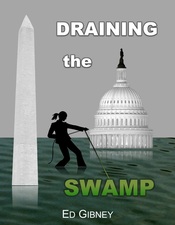
Perhaps we would get somewhere new if we stopped arguing about big government vs. little government, and instead agreed to focus on efficient government. That's going to take someone running for office though who is less of a politician and more of a wonk who is interested in being a chief executive officer as the head of the executive branch of government. We haven't had anyone run on that kind of a platform before, but hopefully this sample passage from my new novel Draining the Swamp will inspire someone out there to take that idea seriously.
To set this up, the heroine of my novel, Justine Swensen, has come to DC to change things. She was a passionate, young idealist when she got there as a staffer for a newly elected Senator, but over the next 30 years, she rose through the legislative and executive branches of government holding many meaningful positions along the way that taught her all about the inner workings of our government. Eventually, she runs for the presidency (NO SPOILERS!), and has this to say as a small part of her signature campaign speech:
“With that purpose for government, what then is actually the role of the leader of that entity? What part does the president play, and why, therefore, would I be your best choice for the position come this fall during the election? To answer those questions, I want to use concepts from two quick background stories. The first, is the actual root of the word ‘government.’ This word was derived first from the Ancient Greek shipping word kubernismos, which meant to steer, to pilot, and to guide. This later transformed into the Latin word gubernatio, and took on the additional meaning of management. Gubernatio, from managing and guiding, became government.
“After this look at the origins of this word, it will make sense to you why my second story comes from one of my favorite business books – The Future of Management by Gary Hamel. In this book, Hamel describes the ideal role of a leader using a metaphor that is particularly apt for our historical definition of government. In this book, he asked the reader to imagine a large organization as if it were a sea liner. If that were the case, what would be the role of the CEO? Some people would say it is that of the captain barking out orders from the top of an unquestioned hierarchy. Others would say the CEO should be a navigator, charting the course for the future. A few would even say he or she should be the boiler room engineer stoking the fires of the engine – not with coal, but with inspirational words of motivation. These are all fine choices that will help the boat move forward, but Hamel argued that the role that would best determine the ship’s fate, the most important one that a CEO, or in this case a president, can take on, is that of the boat’s architect. The architect gets to design how many levels there are, how fast the rudder turns, what visibility the crow’s nest has, what instrument panel is in the control room. The architect in fact plays the largest role in determining the fate of all the other positions on the ship.
“Bringing the point of these two stories into focus, I say that the president can best steer, pilot, or guide – kubernismos – the management, or gubernatio, of his or her government by playing the role of architect. As your president, I will not be the one executing the mission of the executive branch. But as its head, I can design a better ship to sail us towards the destination or vision that I laid out for the government. As you know, I have devoted my entire career, over thirty years, to working my way through all of the decks of this USS United States. From the overseers on Capitol Hill to the interns working beside them. From the individual agencies executing the most specific missions, to the Executive Offices of the President determining their budgets and personnel. From the outsiders hired to help, to the insiders who wished they’d receive more of it. From sea to shining sea. I know the ins and outs, the incentives and deterrents, the forces at work, and the heroes and villains, that all play a part in this story. And I know how to build you a better organization. I know how to be your President of these United States.
Wouldn't you like to vote for someone who promised that?

